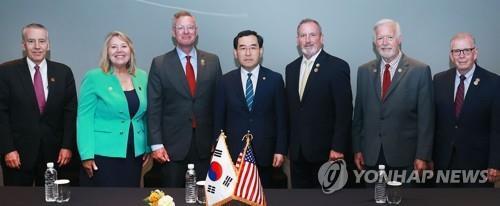SEOUL, July 31 (Yonhap) — South Korea’s industry chief met with a visiting U.S. congressional delegation Monday, and discussed bilateral trade and industry issues, including the Inflation Reduction Act (IRA) and the Chips and Science Act, Seoul’s industry ministry said.
The eight-member bipartisan delegation came to South Korea for talks on various trade and industry issues, led by Jason Smith, who chairs the U.S. House Ways and Means Committee in charge of reviewing and making recommendations for government budgets, according to the Ministry of Trade, Industry and Energy.
During the meeting in Seoul, Minister Lee Chang-yang stressed the need for the United States to draw up detailed guidance on “foreign entities of concern” rules, or FEOC, that excludes battery manufacturers from China and other nations of concern from incentives under the IRA.
The IRA offers tax credits of up to US$7,500 to each buyer of a new electric vehicle (EV) only assembled in North America. It also requires EV batteries to be made with a certain portion of minerals mined or processed in the U.S. or countries or regions that have free trade agreements (FTA) with Washington.
Lee also asked for the U.S. expansion of the list of nations that provide EV battery makers with critical minerals affecting eligibility for credits under the IRA.
While critical minerals from 21 nations with which the U.S. has an FTA will meet the IRA requirements, South Korea has said the countries’ current supply capacity is far from sufficient to satisfy all the requirements and some minerals are only available in specific areas.
Speaking of the Chips Act, the minister sought U.S. congressional support for strengthening cooperation on the semiconductor industry between the two nations.
Under the act, foreign chipmakers can receive subsidies and tax incentives for setting up production facilities in the U.S., though the act came with strings attached.
The two sides also discussed stable energy supplies, as the U.S. is a major supplier of oil and liquefied natural gas for South Korea.
“The U.S. Congress’ attention and interests are crucial for the two nations to boost cooperation in a broader range of energy issues, including nuclear power generation, small modular reactors and clean energy,” Lee told the delegation.
The meeting was also attended by South Korea’s Trade Minister Ahn Duk-geun, the ministry said.

This file photo, provided by South Korea’s industry ministry, shows Minister Lee Chang-yang (C) posing for a photo with a visiting U.S. congressional delegation in Seoul on June 30, 2023. (PHOTO NOT FOR SALE) (Yonhap)
graceoh@yna.co.kr
(YONHAP NEWS)
